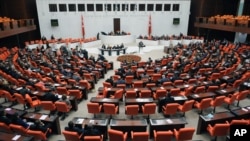Turkey has deployed tanks and armored vehicles to reinforce its border with Syria as the Turkish parliament prepares to authorize military action against Islamic State (IS) jihadists. But analysts warn these moves are being met with resistance as questions remain over what form military action would take.
The Turkish parliament is due to vote Thursday on two motions empowering the government to sanction military operations in Iraq and Syria.
The motions come as the President Recep Tayyip Erdogan steps up his rhetoric against the Islamic State.
In an interview published this week, Erdogan indicated that Turkey was ready to take part in U.S.-led military operations against the radical Islamist group. But Semih Idiz, international relations columnist for the Turkish newspaper Taraf and the Al Monitor website, warns the government is facing strong opposition to any military action.
"There is no support from the opposition," said Idiz. "The question about public support, I am sure there is lot of public concern about what it will mean for Turkey. On the other hand, Erdogan has been striking a leadership position (and) he may be able to sway the public on this."
With Turkey bordering Syria and Iraq, analysts say, Washington sees its NATO ally as key to its ongoing efforts to move against the Islamic State. However, thus far, Ankara has refused to take part in military strikes.
Soli Ozel, a professor of International relations at Istanbul's Kadir Has University, says Erdogan faces a very difficult task in trying to convince the public to support military action, with opposition particularly strong within his religious conservative Muslim voting base.
"The general public would not look very favorably for Turkey bombing other Sunni Muslims, as a general rule," said Ozel. "Even those who don't particularly care about the sectarian or religious affinity between the two populations, they would not want Turkey to meddle in, to get into a war in the Middle East, when you know you going to be sucked in and you are never going to get out."
Analysts say adding to the concern is the question of what a Turkish military intervention would entail.
The president has increasingly pushed the idea of creating a "no fly zone" and what he calls a "safety zone" in the part of northern Syria that borders Turkey.
Analyst Idiz says such a move could help stem the flow of Syrian refugees, hundreds of thousands of whom have flooded into Turkey. But he says it's also fueling political concerns over Ankara’s motivations.
"I think it’s mainly to prevent more refugees streaming into Turkey; I think this is the main consideration," said Idiz. "There are those amongst the opposition that say Turkey is trying to move into Syria to try and gain a foothold against Assad. There are those who believe Erdogan is trying to play some kind of game to prevent the Kurds in northern Syria and is keen about a buffer zone to put in the military in the region."
Turkey's government has concerns over any measures that might serve to strengthen ethnic Kurds fighting for autonomy in Syria, Iraq and Turkey. Iraqi Kurds have been at the forefront of the fight against the Islamic State in northern Iraq.
Turkey’s main pro-Kurdish party has accused the government of colluding in the Islamic State's battle against Syrian Kurds along Turkey’s border -- a charge the government denies.




